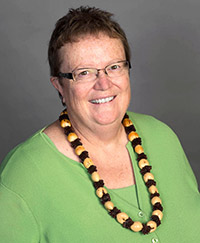Wrigley works to advance diversity in PR

Marketing Communication Associate Professor Brenda Wrigley
Emerson College Marketing Communication Associate Professor Brenda Wrigley has spent her academic career championing equality and inclusion in the field through her research.
Now she’ll continue the fight from a seat on a national committee aimed at making the public relations profession more inclusive.
Wrigley, who is also chair of the Marketing Communication Department, has been named to the Diversity and Inclusion Subcommittee of the Plank Center Board. The Plank Center for Leadership in Public Relations, based at the University of Alabama, has a mission “to help develop and recognize outstanding diverse public relations leaders, role models, and mentors to advance ethical public relations in an evolving, global society,” according to its webpage.
“This organization really gets something done and marshals some financial resources,” Wrigley said. “These people are really serious about [inclusion] and that’s why I agreed to do it.”
The drive for diversity is not new to the PR profession, Wrigley said, but the process has been an evolution.
The Plank Center is named for UA alumna Betsy Plank, often called the “first lady” of PR and the first woman to head a division of Illinois Bell (now Ameritech) in the early 1970s. Plank was a pioneer for women in the industry, but in subsequent decades, focus on diversity has broadened to include race and sexual orientation, Wrigley said.
Wrigley, like many academics, has let her personal experience drive her research. After seven years of running up against discrimination as a woman in a corporate environment, Wrigley did her doctoral dissertation on the glass ceiling in public relations management. Later, she expanded her research to include intersectionality, and the complex way that people experience identity.
“The good thing is that these discussions have made it into the culture; they’ve made it into the presidential campaign,” Wrigley said. “People never used to talk about equal pay for women, except in the ’70s when they were talking about the Equal Rights Amendment, and then it didn’t pass.”
But there is still a lot of work left for the Plank Center to do, she said.
The Lilly Ledbetter Fair Pay Act of 2009, a federal law that effectively eliminates the statute of limitations for women filing a lawsuit over unequal pay, is a good start, Wrigley said, but it’s not enough. There is still no comprehensive federal employment nondiscrimination protection for the LGBTQ community, and racism persists in all quarters.
As an alumna of the University of Missouri, she said she “watched in horror” last fall as a string of racist incidents were followed by a tepid response from university administration and the eventual resignation of the president.
“But the great thing is, I’m in a place where all of this is front and center,” Wrigley said. “We have a wonderful Office of Diversity and Inclusion; we have wonderful people leading the charge; we have training [for faculty and staff].”
Wrigley said that as a member of the Plank Center’s Diversity and Inclusion Subcommittee, she’d like to get that type of training onto campuses across the country.
Sylvia Spears, Emerson’s vice president for diversity and inclusion, said Wrigley was a great choice for the subcommittee.
“Brenda is well known for her commitment to advancing diversity and inclusion in the field of communication and at Emerson,” Spears said. “I am thrilled that she will be bringing her knowledge and expertise to bear on this important industry-wide initiative.”
Categories